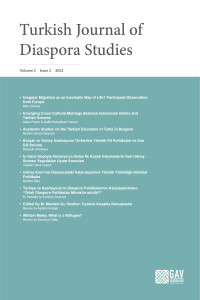Abstract
References
- Bauböck, R. (Ed.). (2018). Democratic inclusion. Manchester University Press. https://doi.org/10.7765/9781526105257
- Brubaker, R. (1992). Citizenship and nationhood in France and Germany. Harvard University Press.
- Esser, H. (2009). Pluralisierung oder Assimilation? Effekte der multiplen Inklusion auf die Integration von Migranten. Zeitschrift für Soziologie 38(5).
- Foroutan, N. (2016). Postmigrantische Gesellschaften. In H. U. Brinkmann & M. Sauer (Eds.), Einwanderungsgesellschaft Deutschland (pp. 227–254). Springer Fachmedien Wiesbaden. https://doi.org/10.1007/978-3-658-05746-6_9
- İyi, M. M. (Ed.). (2021). Kesitler: Üçüncü kuşakla konuşmalar: Türkiye-Almanya işgücü anlaşmasının 60. yılı (1. baskı). Gav Perspektif.
M. Mustafa İyi (Ed.), Kesitler: Üçüncü Kuşakla Konuşmalar, GAV Perspektif Yayınları, 2021, pp. 410, 72 TL, ISBN: 978-605-73877-0-7
Abstract
On the sixtieth anniversary of the labor migration from Turkey to Germany, social scientists must contemplate the position of the descendants of the guest-workers in contemporary German society as an exclusive social phenomenon. Germany has considered labor migrants to be temporary residents for a long time, therefore, avoiding enacting the legal framework to recognize their substantive membership rights in the polity. Until the amendments at the beginning of the 21st century, formal citizenship was largely inaccessible for labor migrants and their families due to the jus sanguinis (right of blood) principle. Historically, German citizenship was defined through an ethnic understanding of nationhood.
Keywords
References
- Bauböck, R. (Ed.). (2018). Democratic inclusion. Manchester University Press. https://doi.org/10.7765/9781526105257
- Brubaker, R. (1992). Citizenship and nationhood in France and Germany. Harvard University Press.
- Esser, H. (2009). Pluralisierung oder Assimilation? Effekte der multiplen Inklusion auf die Integration von Migranten. Zeitschrift für Soziologie 38(5).
- Foroutan, N. (2016). Postmigrantische Gesellschaften. In H. U. Brinkmann & M. Sauer (Eds.), Einwanderungsgesellschaft Deutschland (pp. 227–254). Springer Fachmedien Wiesbaden. https://doi.org/10.1007/978-3-658-05746-6_9
- İyi, M. M. (Ed.). (2021). Kesitler: Üçüncü kuşakla konuşmalar: Türkiye-Almanya işgücü anlaşmasının 60. yılı (1. baskı). Gav Perspektif.
Details
| Primary Language | English |
|---|---|
| Subjects | Political Science |
| Journal Section | Book Review |
| Authors | |
| Publication Date | September 30, 2022 |
| Submission Date | July 19, 2022 |
| Published in Issue | Year 2022 Volume: 2 Issue: 2 |
Turkish Journal of Diaspora Studies is licensed under a Creative Commons Attribution-NonCommercial 4.0 International License (CC BY NC).


